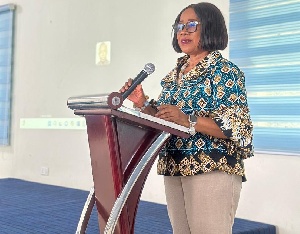- Home - News
- Elections 2024
- News Archive
- Crime & Punishment
- Politics
- Regional
- Editorial
- Health
- Ghanaians Abroad
- Tabloid
- Africa
- Religion
- Photo Archives
- Press Release
Health News of Monday, 2 June 2025
Source: www.ghanawebbers.com
Ghana must recognise child nutrition as a fundamental right, not a privilege – Dr Charity Binka
Dr. Charity Binka, Executive Director of Women, Media and Change (WOMEC), urged the government to treat child nutrition as a human right. She spoke at a workshop in Accra, emphasizing that nutrition should not be a privilege for a few.
Dr. Binka envisioned a Ghana where no mother sees her child suffer from hunger. She wants every child to grow strong and healthy, with nutrition recognized as a fundamental right.
The workshop was organized by the Coalition of Actors for Public Health Advocacy (CAPHA) and WOMEC. It brought together civil society organizations and media professionals to discuss maternal and child nutrition.
Dr. Binka stressed that Ghana must move beyond words on nutrition policy. The country has resources to combat malnutrition if accountability improves. “Ghana should not be battling malnutrition,” she said.
She highlighted that Ghana has fertile land, capable farmers, and committed professionals. However, there is a lack of coordinated efforts to address the nutrition gap.
Dr. Binka expressed concern about undernutrition rates among children under five years old. She revealed that 18% are stunted while 7% suffer from wasting, calling these figures devastating.
“These are real children and families affected,” she warned. Malnutrition threatens health outcomes and national development, weakening the workforce and increasing healthcare costs.
She demanded government accountability regarding nutrition funding. Dr. Binka noted a lack of transparency in how funds are used for nutrition initiatives.
The workshop also launched the “Nourish Ghana” project aimed at combating malnutrition nationwide. This initiative is supported by WOMEC, CAPHA, and the Eleanor Crook Foundation.
“Malnutrition is not just a health issue; it’s an emergency,” Dr. Binka stated. She called for integrating nutrition into all sectors with adequate budgeting at all levels.
She advocated for public education on breastfeeding and nutritious local foods prepared hygienically. Dr. Binka challenged the media to reshape conversations around nutrition in Ghana.
“The media can influence public opinion,” she said, urging them to prioritize malnutrition in national discussions.
Looking ahead, WOMEC and CAPHA plan robust media campaigns over the next year. They aim to engage policymakers and strengthen partnerships across the country.
This workshop marked an important step in addressing malnutrition in Ghana as both a health issue and a matter of justice.











